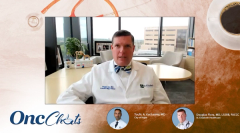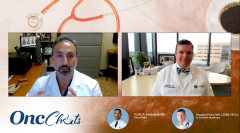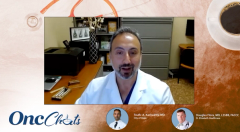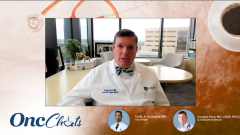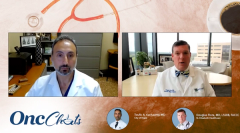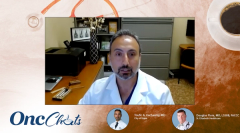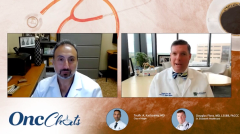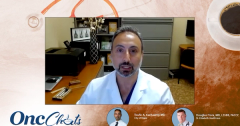
Assessing the Promise of AI in Oncology: Improving Patient Interactions and Experience

In this seventh episode of OncChats: Assessing the Promise of AI in Oncology, Toufic A. Kachaamy, MD, and Douglas Flora, MD, LSSBB, FACCC, discuss how artificial intelligence tools may be utilized to improve wait time for treatment, to provide more time for provider-patient interactions, and more.
Episodes in this series

In this seventh episode of OncChats: Assessing the Promise of AI in Oncology, Toufic A. Kachaamy, MD, and Douglas Flora, MD, LSSBB, FACCC, discuss how artificial intelligence (AI) tools may be utilized to improve wait time for treatment, to provide more time for provider-patient interactions, and more.
Kachaamy: I’ve seen even some studies that looked at improving wait time for treatment, [with] radiation, for example. Is that something you can share some information on, where you get the patient on the treatment faster?
Flora: Yeah, think about the complexity of the dosimetrists and the physicists and the high-level calculus that’s required to figure out the decay of electrons or proton beams over space. It’s a gigantic bottleneck in radiation oncology, with many, many patients needing treatment and very, very few doctors coming in the future to do these really, really detailed treatment plans. There are a lot of software tools that are now looking at how you can conform radiation beams, how you can isolate healthy tissue from targeted cancer-related tissue, and there’s some published reports looking at decreasing the time, from 2 or 3 hours to look at a generative treatment plan with the human eye to condense that to minutes.
Wouldn’t it be nice if we could extend our radiation oncology time so they could spend more time in the room with patients and make this more efficient for the physicist? That’s a definite need and it’s being explored rapidly. There’s obviously a great deal to be learned, but we’ve seen stuff. I even remember a JAMA study [published] back in 2019 that looked at this, that was able to take that time to treatment and really, really compress it with very, very tight, very carefully designed treatment plans, so I think that’s one we can count on absolutely moving to the forefront soon.
Kachaamy: Fantastic, and you mentioned oncologists going back to doing what they’re supposed to do in terms of human interactions. I’ve heard two schools of thought on this, AI is going to make you more efficient, and you’re going to be asked to do more in less time, or AI is going to allow you to delegate the non-human aspect of care and become more human. What are your thoughts? How is AI going to transform the practice of oncology? [Is it] for the better, for the worse, or is there going to be some time where we’re going to just have to adapt and figure it out?
Flora: Well, I think it’s inherent upon us to guide those discussions. That’s why I wanted to generate a journal like this, where those things can be discussed specifically by the people they touch. I will tell you, I’m an optimist in this stuff, and I’ve spent a lot of time studying it. I will say the efficiencies it will offer us in even a year to 2 years are going to be earth-shattering and I don’t think the majority of oncologists understand what it’s going to be like when they get back 2 to 4 hours a day if they’re not typing in EPIC. [Things like] appointment scheduling, administrative duties, calendar stuff, [and] easy patient communication will be taken off our desks—quickly.
I think it’ll take a little bit longer before we become comfortable with improved decision-making. But I do love the idea that a digital personal assistant can be telling me “Are you aware that an article that speaks directly to this [was published] in the Japanese Journal of Oncology 2 weeks ago?" and [it can] pull that up or tell me that this patient had a similar nodule in a scan that was done a year and a half ago in Tuscaloosa that I wasn’t aware was even there.
Where I think it’s important for us, as oncologists, is that the art of oncology is really that intersection of love and science; it’s going to be us that maintain that deep empathy for patients, that will recognize if a patient’s pupils dilate in fear, or the daughter starts to get hives across her chest because we’re levying too much bad information on them and they’re not quite ready to digest that.
So, I think that the role of the physician may shift when we’re augmented, and we all have access to the same fund of knowledge, we all have some decision support, we’ve all got some data assimilation. I hope that that frees us up to do more of the human touch and that that puts us back in the room—off the computer, not typing, and looking at those patients so we can see the fleeting look across the husband’s face or the little nuances of our visit that make it more human and let the AI take over the routine rote mechanical stuff.
Kachaamy: That’s beautiful. That’s so needed now, in that time when many of us are talking to the patient and looking at the screen.
Check back on Monday for the next episode in the series.


